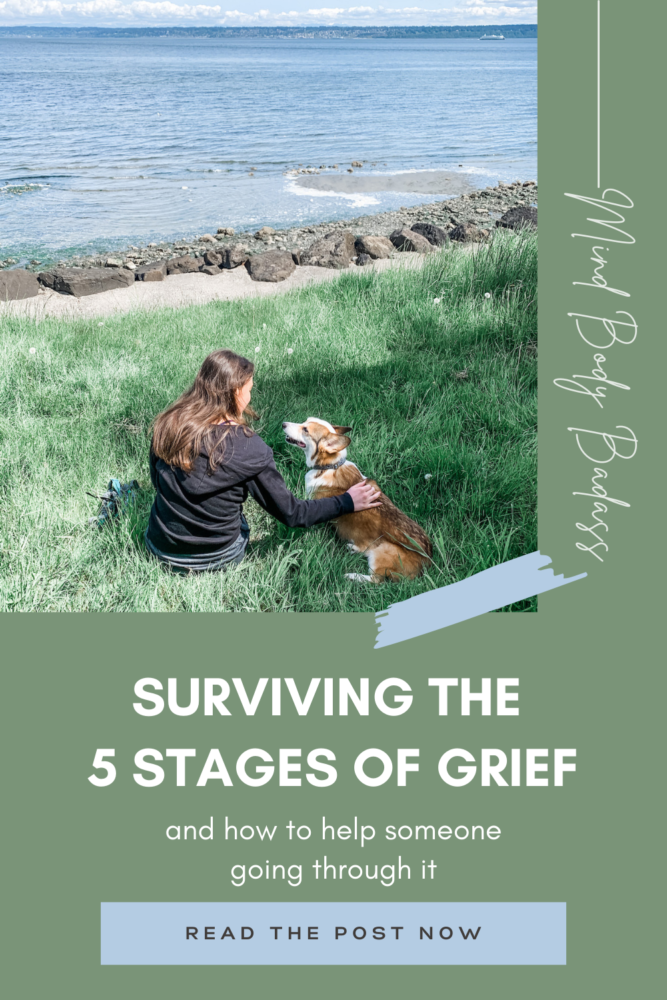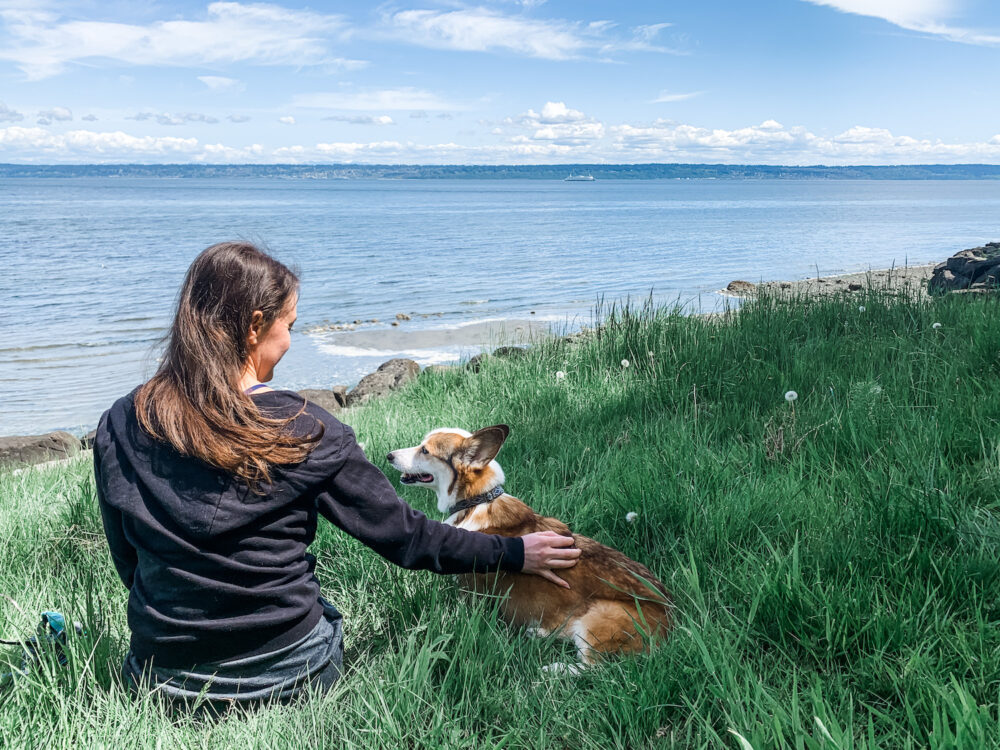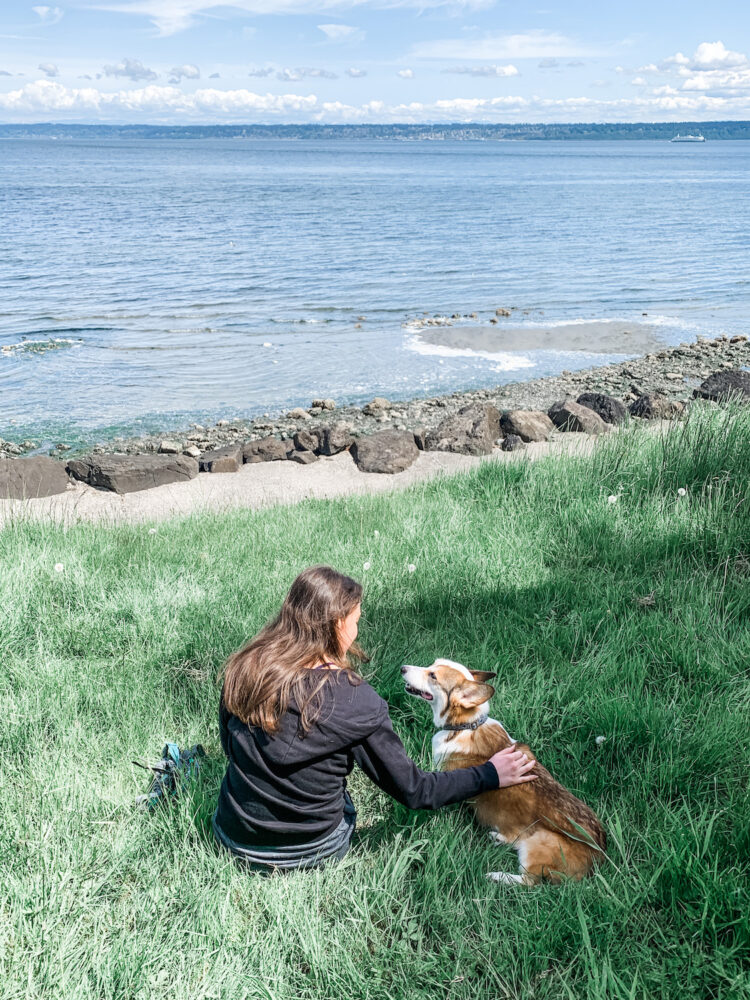Surviving The 5 Stages of Grief (And How To Help Someone Going Through It)
At some point or another, all of us will experience grief.
I’ve experienced major grief for the first time in my life recently, and it’s been hell. There’s really no pain comparable to that loss. But there are ways to make it easier, so I want to share with you what I’ve learned along the way.
So many of us are uncomfortable even talking about grief—it’s become a taboo subject. People avoid even talking about it, and that makes a lonely time even harder for the person who’s grieving.
You can always tell when I’m going through a painful time in life when I’ve stopped writing. I took a break from the blog after I left my marriage (which definitely felt like its own form of death and grief), and recently I’ve done it again. I needed time to process and heal from a major loss. And that’s one of the most important pieces of advice I can pass along—take as much time as you need. There’s no right way to grieve.
My precious dog, Corgi (the corgi), passed away on May 28, 2021.
Corgi was, in every sense, my child, especially since I don’t plan to have human children. I’ve lost some family members, but this was the first death I experienced that really hit me deeply.
I picked Corgi out from a litter—it was truly love at first site. My ex Matt and I had saved up and been talking about getting our first puppy together for months, and as soon as I saw him, I knew. He was the dog for me. And he really was.
I’ve never met another dog as smart as Corgi. I trained him in all sorts of tricks, agility, and obedience, and he was always hungry to learn more (and get more treats). My favorite thing was teaching him something new–it was stunning to me to watch his mind at work as he tried to figure it out. I liked the challenge of trying to communicate to him to get him to do what I wanted, like learning how to open a door on command. And then his joy when it clicked for him was a joy so strong I felt it fill up all of me as well, and we’d celebrate together by jumping and running around.
Every time I looked up, Corgi was there, staring at me. He gave me more love than I’ve ever felt, and I loved him just as much in turn.
To be honest, I struggle sometimes forming human friendships and connections. But with Corgi, we could literally communicate with each other with our eyes.
I’d played out his inevitable possible death in my mind hundreds of times with countless scenarios. But nothing prepared me for the grief.
Brené Brown calls it “foreboding joy,” or mentally dress-rehearsing tragedy. It’s something our minds do to try to protect us: thinking of worst-case scenarios at moments when we’re filled with love, because we’re so afraid of getting hurt, of losing what we have.
The hard truth is, though, that everything is temporary. Every connection will end. Death is always around the corner. And nothing prepares you for when it hits. Not even rehearsing the worst in your mind.
It was always my biggest fear, losing him, even though I knew this, even though I knew I one day would. (It’s cruel, isn’t it, how short our companion animals can live)
I’d already gone through a horrible year. 2020 was really hard for me, as it was for many. I lost most of my work, had to give up my apartment (and so grateful to have had friends who took me in). Matt had the dogs (Corgi and sweet chihuahua mix Peach) all year in Washington, because we share custody.
One of the things that got me through the hard days was thinking about my babies and dreaming about having them back with me again soon.
And then, mere weeks before I was set to move into a new apartment, and finally have the dogs with me again, I got the call we all dread.
You know that call.
You know that feeling. That horrible sink down into a twisted reality where life loses its meaning and you find yourself falling, falling
falling.
And then slammed into the concrete below.
I answered Matt’s call and he was crying. I knew.
“Corgi has cancer. The vet says he only has a few days to live.”
What followed was a whirlwind. I flew to Washington on the next flight I could get. I cried the whole way. Corgi was weak, he’d gotten sick suddenly and developed a bad cough, which is what prompted Matt to take him in. I’d seen Corgi shortly before and he had seemed fine.
It felt like this news had hit us out of nowhere.
Cancer surrounded Corgi’s heart. He could barely keep food down. We gave him the most beautiful final days we could, taking him to an AirBnB on a lake, and Matt drove him down to California.
The first weekend I moved in to my apartment, Corgi took his last breath. He was struggling to breathe in the cold darkness of the night. Matt had stayed awake to sit with him, I’d tried to go to sleep despite knowing he was struggling, because I had to teach classes the following morning. I’d prayed he could just hold on a little longer. But Matt woke me up in the middle of the night.
“It’s time.”
We took him to an emergency vet 30 agonizing minutes away, the only one open that would allow us to be in the room with him when they put Corgi down. (Thanks again, COVID.)
I still feel haunted by it, and the grief is just as strong now, three months later.
I’m sure that if you’re reading this, you likely know exactly what I mean. When you love someone with your whole, full heart, it’s devastating to have that ripped away. And it takes time to heal.
The weekend after I lost Corgi, I taught a yoga class out on the cliffs of San Diego. I met a woman who had lost her dog three months prior, and it was still hurting with her just as much as that first week. Now that I’m three months in, I understand even more deeply, because it’s still with me too.
If you’re going through grief right now, I’m so sorry. I’m sending you a huge hug.
Grief can take many forms. Sometimes it’s not even losing a loved one. You can feel grief around any kind of loss. Like I mentioned above, you can feel grief with divorce, losing a job, moving, or a friendship ending. Any kind of loss can come with grief.
The most important thing to remember is that the magnitude of your grief corresponds to how much you cared. And that’s a good thing.
It’s a superpower to care, to love. It’s hard to open ourselves up to that vulnerability because we know the loss may come at some point down the line. But what’s the alternative? Not loving at all? Closing ourselves off to feeling?
I’d much rather have loved this dog so much I feel a burning hole in my chest every day … than to have never had him at all.
(By the way, I highly recommend diving into more of Brené Brown‘s work if you’re not familiar with her—she focuses primarily on vulnerability, and how it’s essential to living a whole-hearted, full, courageous life. Try reading her book Daring Greatly to start.)
As they say: It’s better to have loved and lost than to never have loved at all.
The 5 Stages of Grief
There are five stages of grief, according to the widely-used Kübler-Ross model. It’s important to note that healing is not a linear process—meaning you won’t go neatly down from one stage to another. You’ll likely bounce around from Stage 1, to 3, to 2, to 3, to 4, to 1, to 3… you get the idea. Think of these more as concentric circles than a line. There’s no one way to process grief, but it can be helpful to understand what you’re experiencing, and to know that’s all a healthy part of your natural healing process.
They are:
1. Denial and Isolation
Our brains’ main priority is to keep us safe. So it doesn’t want to accept new painful information, and our first response to grief is often denial. You just don’t want to believe it’s true.
The entire plane ride to Washington, I kept running it through my mind: surely the vet was wrong? surely they misread Corgi’s charts? there’s no way this is happening.
This isn’t happening.
This isn’t happening.
With denial comes isolation. We don’t want to face any more reminders of the truth. I couldn’t bring myself to talk to the friends who called me when I first found out. It felt as if talking about it would make it real. Grief can be overwhelming to deal with, so it’s normal to withdraw.
2. Anger
After denial and isolation, you feel anger. You feel like WHY is this happening to ME. I wanted to scream and scream. At God, the Universe, the birds, the sun, everyone and everything. I was so angry that I had to feel this pain, so unfair that this would happen.
Corgi was only 9. As a Pembroke welsh corgi, I’d long assumed he’d lived to around age 15. I often (half) jokingly looked at his beautiful doggy face and told him he’d live to 20. And deep down, I’d believed it. Or wanted to. So I felt immense rage at losing him so young, especially because I gave him the best dog food, he was super healthy, I gave him CBD and supplements and somehow hoped I could bargain my way to buying him more years of life.
3. Bargaining
Speaking of bargaining–it’s stage three of grief. Our brains are fighting to maintain some sense of control over the situation, so we start trying to come up with ways out of it. You might pray, begging for a miracle. I know I did. Or you may try to desperately scramble for solutions. What if we try this— what if we do this—. And in some cases, maybe, this can work out. We can always hope. But often we simply can’t change what’s set in motion, and that’s okay.
It’s not on us.
You did all you could. Please know that.
4. Depression
When you start to really feel the full weight of your loss, you’re ready for stage four, the most fun one of all! Depression!
This is the stage I resent the most. I’ve struggled with chronic depression my entire life, so it doesn’t actually take all that much to tip me back over the edge and right back into it. I always describe it as if my head is swollen. The pain literally makes my head throb. I feel absolutely hopeless about every thing, and struggle to feel any emotion at all, except for deep pain and sadness.
The depression stage is challenging. But it’s so important to remember that it’s temporary. You will not feel this way forever. With grief-induced depression, it goes away eventually on its own. Sometimes that takes some extra help though, so please seek out therapy (I recommend using Psychology Today to find one) or medical care if you feel you need more support.
And it’s okay to not feel okay. It’s okay to be depressed. It’s a healthy response to grief. Like I said above, when you love and lose that much, of course you are going to mourn. Our society is super uncomfortable with sadness. It often seems more acceptable to be angry than drowning in depression. Please know that other people’s discomfort isn’t about you or your situation. It’s about their unwillingness to face the hard side of life—and we’ll talk about more ways to handle this in a moment.
You deserve to be loved and supported, even if that’s not always available to you. Breathe, and know the depression stage will pass. And when it does, you finally reach peace in stage five:
5. Acceptance
Eventually, you will come to terms with your loss. Grief leads to acceptance. You’re able in this stage to wrap your head around the full experience of what’s happened, and accept that what is, is.
This doesn’t mean you’re done with your grief, though. Coping with it does get easier with time, but that doesn’t mean the pain always disappears completely. Sometimes it’s a lifelong process. And acceptance isn’t saying that what happened is okay—just that it happened.
I have a feeling I won’t ever get over losing Corgi. I’m planning to get a tattoo of his outline, so I can have him with me always. I’ve never gotten a tattoo before, but I’ve always known I’d do it after I lost him, because he’s forever branded on my heart. I’d say I’m probably in the acceptance stage at this point, but it still hurts, and sometimes I dip back into one of the other stages.
There’s no fully letting go, but there is a reframing of the loss. As time goes on, it’s easier to look back and feel gratitude for the love or joy you had, rather than focusing on the pain of the loss.
Sometimes I still forget Corgi is gone—I think he’s still with Matt, or just behind me. And recently, butterflies and birds have been flying right in front of my face, catching me off guard. I truly believe it’s Corgi saying hello. I talk to his ashes and light a candle for him every day. It helps me feel better to continue to feel connected with him even though he’s gone, at least from this world.
How To Help Someone Going Through The Stages of Grief
The hardest part, for me, of going through grief (and I’m definitely still going through it), was experiencing how uncomfortable other people are with it. I had some wonderful friends and family who reached out and sent gifts for Corgi and supported me through his decline. But I also noticed some friends who never mentioned anything about it, and still haven’t, even though I know they know.
I’m not upset about it, because I know how hard it is to face the uglier side of life. But grief really does come for us, at some point, if you’re opening yourself up at all.
We all experience it, but it’s still hard to know how to be there for a loved one when they’re going through it. But here’s what I’ve found to be the most meaningful ways to reach out after going through it myself.
Best ways to help someone in grief:
- Leave loving messages that don’t require a response
- Pray for them
- Send a meal, flowers, or a gift
- Help with medical/funeral costs or planning
- Give them space when needed
- Make a scrapbook of their loved one
- Offer to help with home tasks
- Don’t force talking about it, but do acknowledge that you know they’re hurting, and why
- Don’t worry if you’re not sure what to say
- Just let them know you care
I promise that if you do any of those things to support a loved one going through grief, it will mean more to them than they’ll ever be able to express.
And if you’re the one going through grief, it’s important to take care of yourself.
Nurture and love yourself through this wounded period, and make the days as easy on yourself as you can, for as long as you need.
Best ways to help yourself heal from grief:
- Create an altar or ritual to remember your loved one (I light a candle to Corgi)
- Get a massage (you have to get the tension from the pain out of your body)
- Take long baths with epsom salts
- Incorporate your loved one’s ashes in a special piece of jewelry (like this ring) or art
- Turn to your spiritual practice
- Go for long walks
- Spend time with a friend
- Meditate
- Move your body
- Cry as much as you need
- Watch your favorite funny or lighthearted TV show or movie (it’s ok to laugh)
- Do anything that brings you joy (it’s ok to feel moments of happiness)
- Give it time
Remember that all healing takes time.
Grief is a heavy emotional hit—the biggest one of all. And anything that affects your mind and heart will also affect your body. It’s normal to get sick because of grief—I got a horrible skin infection that’s still healing.
So be sure to take care of yourself. Whatever you need, give it to yourself. Don’t judge how you handle the grief, or how long it takes you to heal. All ways of healing are valid.
It’s going to hurt. But it will also eventually hurt less, and less, and less, until hardly at all. Time really does heal all wounds, so even though you may be in the thick of it right now, it will one day be brighter.
You’ll feel joy. You’ll have beautiful days you’ll remember forever. And you’ll love again.
The best way to honor your grief, and the beauty of what you’ve lost, is by celebrating life right now. After all, all we know for sure is that we have this precious present moment.
So open up your heart once more, dear one, and live it.
» Song Vibes «
xo,
Amy
What has your experience with grief been like? Share with me in the Comments in the Disqus section below.
This post is not sponsored, but it does contain affiliate links. I truly love these products and know you will, too. Thanks for supporting the blog!







